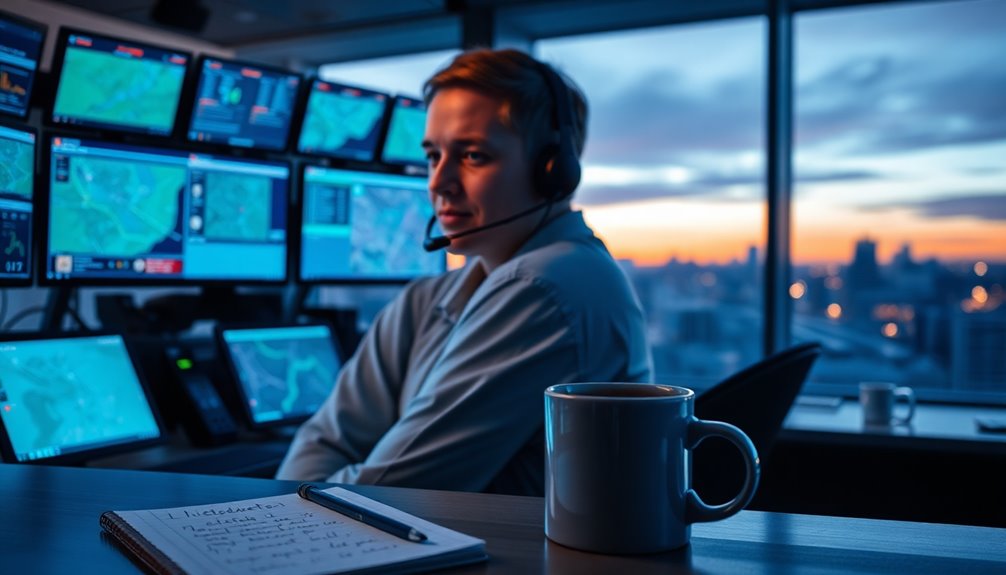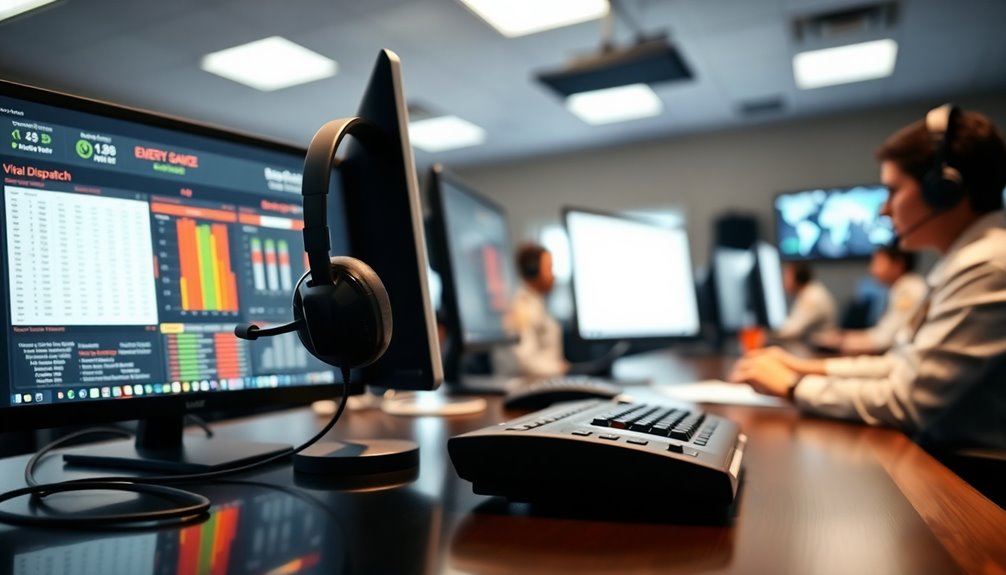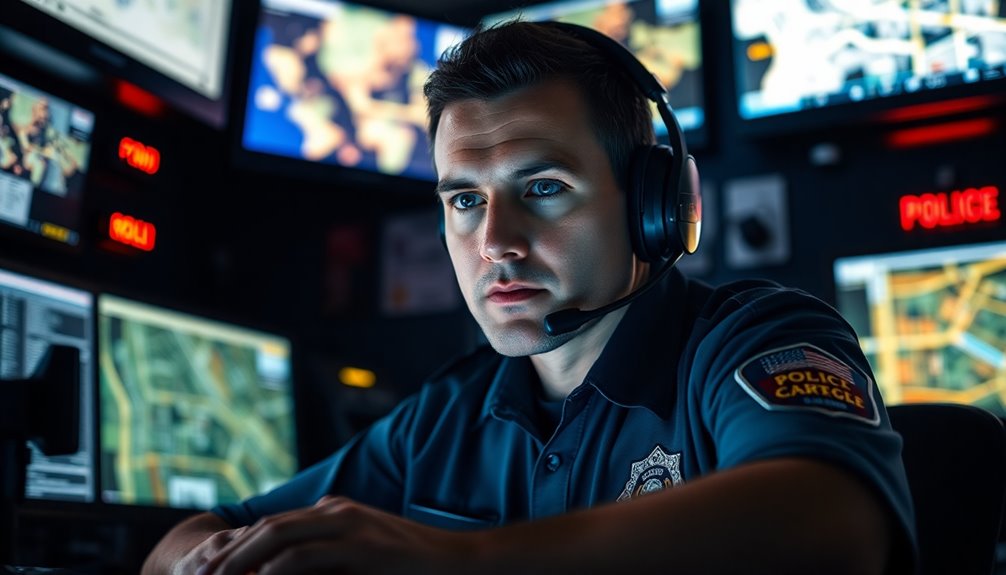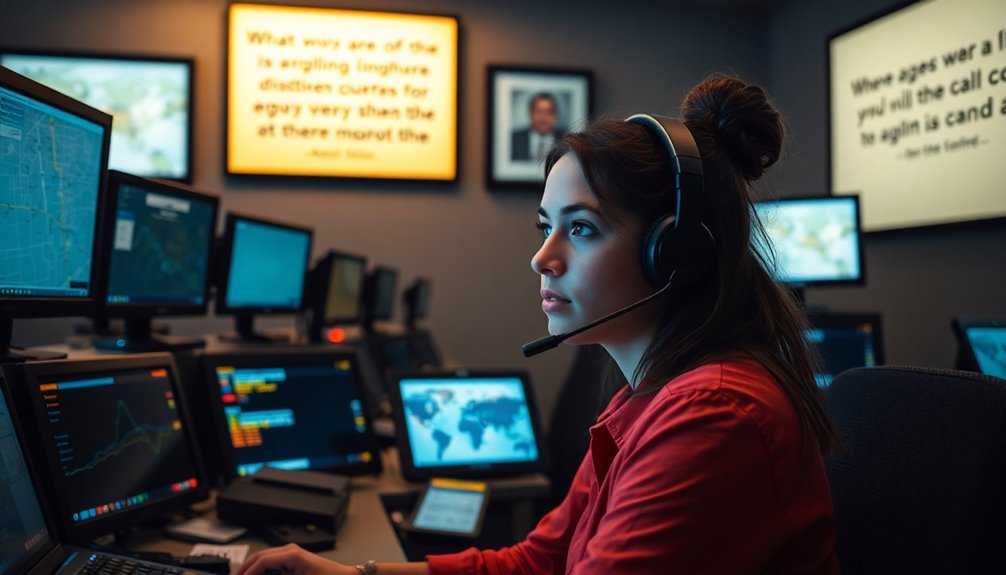As an aspiring police dispatcher, you should ask yourself key questions that assess your readiness for the role. Consider how your experiences align with the demands of multitasking and quick decision-making. Think about your ability to handle distressed callers and prioritize emergency responses effectively. Evaluate your understanding of the company's mission and community needs. Also, reflect on your performance expectations and salary considerations based on local standards. Finally, explore potential career advancement opportunities within the department. Each question not only gauges your fit but also prepares you for a rewarding career in dispatch. There's much more to discover about this essential role.
Key Takeaways
- Understand the importance of effective communication and active listening skills in managing emergency calls and gathering accurate information.
- Prepare to discuss strategies for resolving conflicts with coworkers and supervisors to maintain a collaborative work environment.
- Familiarize yourself with the company's mission and values to demonstrate alignment with their goals and commitment to community service.
- Be ready to articulate your strengths and weaknesses, focusing on those relevant to the dispatching role and your personal growth.
- Research potential career advancement opportunities and necessary training or certifications to enhance your skills and job prospects.
General Questions

When interviewing for a police dispatcher position, it's crucial to address several fundamental questions that reveal your fit for the role.
First, think about how your coworkers and supervisors perceive you. Their insights can demonstrate your ability to work within a team.
Next, consider your future career aspirations; articulate how this position aligns with your goals.
Identify your greatest strengths in dispatching, as well as any relevant weaknesses, and be honest.
Additionally, show your understanding of the company by explaining why you're motivated to apply. This knowledge not only reflects your interest but also your commitment to serving the community effectively.
These general questions set the stage for a successful interview and help establish your suitability for the dispatcher position.
Experience and Background

Your experience and background play a significant role in demonstrating your qualifications for a police dispatcher position. Employers often look for specific skills and past responsibilities that indicate you're equipped for the demands of the job.
Here's a quick overview of essential experience elements:
| Aspect | Importance | Example |
|---|---|---|
| Previous Roles | Shows relevant experience | Worked as an emergency operator |
| Essential Skills | Highlights your capabilities | Proficient in multitasking |
| Decision-Making | Indicates ability to handle stress | Resolved critical incidents |
| Typing Proficiency | Essential for accurate communication | Achieved 70 WPM |
| Insights Gained | Reflects on personal growth | Improved crisis management skills |
Consider how your past experiences align with these aspects to strengthen your application.
In-Depth Questions

In-depth questions during the interview process for a police dispatcher position investigate critical aspects of your interpersonal and decision-making skills.
You might be asked how you handle disagreements with coworkers or resolve disputes with supervisors. Interviewers will analyze your performance under pressure, which is essential in this role.
They could also explore your approach to non-emergency 9-1-1 calls, evaluating your judgment in prioritizing situations.
In addition, you'll need to explain how you assess your performance after calls, demonstrating your commitment to improvement.
These questions help employers gauge your ability to maintain professionalism and empathy, ensuring you can navigate the complexities of dispatching while supporting both the team and the community effectively.
Interview Questions

During the interview process for a police dispatcher role, you'll encounter a variety of questions designed to assess your skills and suitability for the position.
Expect to answer questions that gauge your understanding of the dispatching role and your ability to handle real-world scenarios. Here are three common areas of focus:
- General Knowledge: You'll discuss your understanding of the dispatch process and the importance of teamwork.
- Experience and Skills: Be prepared to highlight your previous experiences and the skills that make you a strong candidate.
- Personal Attributes: Interviewers will want to know how you handle stress, remain calm, and empathize with callers.
Being ready for these topics will help you present your best self during the interview.
Situational Scenarios

Situational scenarios are a vital part of the police dispatcher interview process, as they test your ability to respond to real-life challenges you'll face on the job.
You'll encounter various situations during the interview, such as handling a distressed caller reporting a domestic dispute or coordinating response efforts during a multi-vehicle accident.
It's important to demonstrate your decision-making skills, prioritization of calls, and ability to remain calm under pressure.
You might also be asked how you'd manage conflicting information from multiple sources or support a caller experiencing a medical emergency.
Your responses should showcase your communication skills, empathy, and problem-solving abilities, all vital traits for a successful dispatcher.
Prepare to think critically and respond swiftly in these scenarios.
Skills Assessment

A police dispatcher's skill set is essential for effectively managing emergency calls and coordinating responses.
You'll need to excel in several areas to guarantee smooth operations during critical situations.
Here are three key skills to focus on:
- Active Listening: This helps you understand caller needs and gather accurate information quickly.
- Quick Decision-Making: In emergencies, your ability to assess situations rapidly and make informed choices can save lives.
- Organizational Skills: Managing multiple calls simultaneously requires strong organizational abilities to prioritize tasks effectively.
Company Knowledge

Understanding the company where you're applying as a police dispatcher is vital for your success in the role. You'll need to know the department's mission, hierarchy, and community needs. Familiarizing yourself with recent events affecting the department can help you demonstrate your commitment and awareness during the interview.
| Key Areas | Importance |
|---|---|
| Company Mission & Values | Aligns your goals with the department's |
| Department Structure | Helps navigate roles and responsibilities |
| Community Concerns | Enhances service delivery |
| Recent News | Shows your engagement with current issues |
Personal Attributes

What personal attributes do you bring to the role of a police dispatcher? Your character plays an essential role in how effectively you handle emergency situations.
Here are three key attributes you should embody:
- Patience: Dealing with distressed callers requires a calm demeanor and the ability to listen without rushing them.
- Empathy: Understanding and relating to callers' emotions enhances communication and builds trust, making them feel heard.
- Flexibility: The ability to adapt to rapidly changing situations is critical, as every call presents unique challenges that demand quick thinking.
These personal attributes not only improve your performance but also contribute greatly to the safety and well-being of your community.
Embrace these traits to excel in your dispatching career.
Performance Expectations

Setting clear performance expectations is essential for your success as a police dispatcher. You should establish specific goals for your first three months, focusing on mastering the dispatching systems and protocols.
Understand the criteria your supervisors will use to evaluate your performance, and actively seek feedback from both peers and supervisors. Embrace a commitment to continuous improvement—this mindset will help you develop your skills and adapt to the demands of the job.
Remember, your performance directly impacts community safety, so prioritize effective communication and quick decision-making. Stay organized while managing multiple calls, and don't hesitate to ask questions to clarify your understanding.
Meeting these expectations won't only enhance your confidence but also contribute greatly to your team's success.
Salary and Benefits

As you evaluate your role as a police dispatcher, it's important to assess the salary and benefits associated with the position. Typically, the salary can vary based on location and experience, but it generally aligns with industry standards.
Additionally, understanding the benefits package your department offers is vital for your overall compensation.
Here are a few key points to keep in mind:
- Salary Range: Know the expected salary range for your area and experience level.
- Benefits Offered: Look for health insurance, retirement plans, and paid leave.
- Advancement Opportunities: Think about the potential for raises and promotions, which can greatly impact your earnings.
Frequently Asked Questions
What Are the Typical Shift Hours for Police Dispatchers?
Typical shift hours for police dispatchers can vary, but you're likely to work in 8 to 12-hour shifts.
Many departments operate 24/7, meaning you might work nights, weekends, or holidays.
You'll need to be flexible, as shifts often rotate to guarantee coverage.
Understanding the demands of the job will help you adjust to the schedule and maintain a work-life balance, which is vital for your overall well-being and performance.
How Does the Department Handle Overtime Requests?
Imagine a bustling command center where every second counts.
When it comes to overtime requests, the department prioritizes fairness and operational needs. You'll typically submit your request through a dedicated system, and it gets reviewed by supervisors.
They'll consider factors like current staffing levels and your availability. If approved, you'll get notified, ensuring you're ready to step in when emergencies arise, keeping the community safe while balancing your own commitments.
What Types of Calls Do Dispatchers Handle Most Frequently?
Dispatchers handle a variety of calls daily, with the most frequent being emergency situations, such as accidents, medical emergencies, and disturbances.
You'll also receive non-emergency calls, like noise complaints or lost property reports.
Each call requires you to assess the situation quickly, prioritize responses, and relay critical information to responders.
Understanding the nature of these calls will help you excel in your role and provide the best service to your community.
Are There Opportunities for Mentorship Within the Department?
Yes, there are definitely opportunities for mentorship within the department.
You'll likely find experienced dispatchers or supervisors who are keen to guide you. Engaging with a mentor can enhance your skills and help you navigate challenges more effectively.
It's a great way to gain insights into best practices and department culture.
Don't hesitate to ask about mentorship programs or reach out to potential mentors when you start your journey in dispatching.
What Community Outreach Programs Does the Department Participate In?
When you look into the department's community outreach programs, you'll find various initiatives aimed at building strong relationships with residents.
These might include educational workshops, neighborhood watch meetings, and youth engagement activities.
You'll see how the department actively promotes safety and awareness through these programs, fostering trust and communication with the community.
Engaging in these efforts not only enhances public safety but also strengthens community ties, benefiting everyone involved.
Conclusion
In your journey to become a police dispatcher, reflecting on these essential questions is vital. You'll not only prepare for interviews but also develop the skills needed to thrive in high-pressure situations. Remember, the ability to communicate effectively can be the lifeline in a crisis. As you grasp the depth of these inquiries, you'll find yourself on the brink of greatness, ready to be the calm in the storm when every second counts.
Eugene brings a fresh, dynamic voice to our platform as one of our talented Writers. Specializing in research-driven content, he explores the latest findings in psychology and personal growth, translating them into actionable insights for our readers. Eugene’s work is fueled by a curiosity about what makes us tick and a desire to help others unlock their potential.










